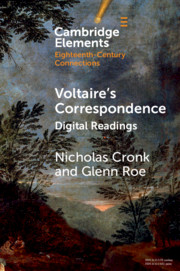18 results
9 - Other Peoples, Other Places
- from Part III - Openness and Domination
-
- Book:
- Remaking the World
- Published online:
- 29 November 2024
- Print publication:
- 19 December 2024, pp 181-201
-
- Chapter
- Export citation
Chapter 27 - France
- from Part V - World Cultures Inspiration and Reception
-
-
- Book:
- Goethe in Context
- Published online:
- 16 May 2024
- Print publication:
- 23 May 2024, pp 263-271
-
- Chapter
- Export citation
2 - Enlightenment and the French Revolution
- from Part I - Enlightenment and Culture
-
-
- Book:
- The Cambridge History of the Age of Atlantic Revolutions
- Published online:
- 20 October 2023
- Print publication:
- 09 November 2023, pp 80-105
-
- Chapter
- Export citation
3 - Herodotus, Historian of the Hebrew People, Without Knowing It
- from Part I - Antiquity’s Modernity
-
-
- Book:
- Victorian Engagements with the Bible and Antiquity
- Published online:
- 28 September 2023
- Print publication:
- 12 October 2023, pp 47-80
-
- Chapter
- Export citation
Chapter 6 - A Slave Named Voltaire; or, Gender and the Making of American Taste
- from Part II - Creating Enlightened Citizens
-
- Book:
- A Caribbean Enlightenment
- Published online:
- 14 September 2023
- Print publication:
- 05 October 2023, pp 143-161
-
- Chapter
- Export citation
Chapter 4 - The Bildung of Humanity and Modern Virtue
-
- Book:
- Herder and Enlightenment Politics
- Published online:
- 30 March 2023
- Print publication:
- 06 April 2023, pp 132-172
-
- Chapter
- Export citation
Chapter 5 - Experimental Philosophy in France
- from Part II - The Heyday of Experimental Philosophy
-
- Book:
- Experimental Philosophy and the Origins of Empiricism
- Published online:
- 17 February 2023
- Print publication:
- 23 February 2023, pp 149-175
-
- Chapter
- Export citation
1 - The Death Penalty
-
- Book:
- The Death Penalty's Denial of Fundamental Human Rights
- Published online:
- 01 December 2022
- Print publication:
- 15 December 2022, pp 31-70
-
- Chapter
- Export citation
16 - The Enlightenment and Its Negative Consequences
- from Part III - The Modern Era
-
-
- Book:
- The Cambridge Companion to Antisemitism
- Published online:
- 05 May 2022
- Print publication:
- 02 June 2022, pp 291-306
-
- Chapter
- Export citation
6 - The Luxury Debate
-
- Book:
- The Consumer Revolution, 1650–1800
- Published online:
- 13 January 2022
- Print publication:
- 03 February 2022, pp 158-179
-
- Chapter
- Export citation
Chapter 5 - Dramatic Character
-
- Book:
- Criticism, Performance, and the Passions in the Eighteenth Century
- Published online:
- 02 March 2021
- Print publication:
- 18 March 2021, pp 153-183
-
- Chapter
- Export citation
Chapter 2 - Zara
-
- Book:
- Criticism, Performance, and the Passions in the Eighteenth Century
- Published online:
- 02 March 2021
- Print publication:
- 18 March 2021, pp 55-82
-
- Chapter
- Export citation

Voltaire's Correspondence
- Digital Readings
-
- Published online:
- 20 October 2020
- Print publication:
- 12 November 2020
-
- Element
- Export citation
Epilogue - A Brief Meditation on History
-
- Book:
- The Antichrist
- Published online:
- 18 September 2020
- Print publication:
- 01 October 2020, pp 285-290
-
- Chapter
- Export citation
Between Fantasy and Philosophy: Saʿdi, Translator of Voltaire’s Zadig
-
- Journal:
- Iranian Studies / Volume 52 / Issue 5-6 / November 2019
- Published online by Cambridge University Press:
- 01 January 2022, pp. 717-737
- Print publication:
- November 2019
-
- Article
- Export citation
Part XXIV - Shakespeare and the Book
-
-
- Book:
- The Cambridge Guide to the Worlds of Shakespeare
- Published online:
- 17 August 2019
- Print publication:
- 21 January 2016, pp 1661-1728
-
- Chapter
- Export citation
237 - Shakespeare in Quotations in French
- from Part XXIV - Shakespeare and the Book
-
-
- Book:
- The Cambridge Guide to the Worlds of Shakespeare
- Published online:
- 17 August 2019
- Print publication:
- 21 January 2016, pp 1700-1702
-
- Chapter
- Export citation
Quality control of rainfall measurements in Cyprus
-
- Journal:
- Meteorological Applications / Volume 13 / Issue 2 / June 2006
- Published online by Cambridge University Press:
- 24 May 2006, pp. 197-201
- Print publication:
- June 2006
-
- Article
- Export citation

